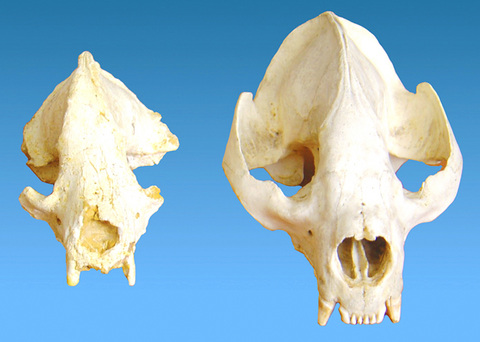About 2 million years ago, in lowland tropical forests of what is now China, lived an ancestor of the giant panda that was very similar to the famed vegetarian bear except about half the size, scientists said.
Writing on Monday in the Proceedings of the National Academy of Sciences, the scientists described a complete skull and teeth of a pygmy-sized panda, shedding light on the origins of this unique, bamboo-munching bear.
The skull is about 60 percent of the size of a modern giant panda's and it has similar anatomical features, suggesting a similar lifestyle, they said.

Photo: AFP
The extinct bear, named Ailuropoda microta, is the earliest known member of the panda lineage, said Russell Ciochon, a University of Iowa anthropologist and one of the researchers.
"It's basically a miniaturized version of the living panda," Ciochon said in a telephone interview.
"Before, we only had teeth of this pygmy giant panda, just some isolated teeth. So we knew it existed, but we had no idea what the skull was like," he said.
"This skull is well-preserved, and has all its teeth intact, and on the basis of this fossil we can say that this bear was a miniaturized version of the modern panda," Ciochon said.
"This shows that the panda lineage has evolved over many millions of years separate from all the other species in the family of bears," he said.
The giant panda is considered the most specialized of any of the eight species of bears alive today. It is a carnivore that lost its hankering for meat and evolved into a committed vegetarian, scientists said.
The skull indicates the panda lineage has been evolving for millions of years completely separated from other bears. While some other bears will eat berries and other vegetation, the panda is the only fully vegetarian one.
Although it is one of the most recognizable animals on the planet, the giant panda is endangered, teetering on the edge of extinction mostly due to habitat loss and encroachment from people. They live in a few upland bamboo forests of China, isolated in rugged mountainous terrain.
It is estimated there are about 1,600 left in the wild.
The pygmy panda was about 1m long, compared to the modern giant panda at up to 2m long.
The creature lived in a moist, lowland tropical forest habitat that had bamboo as a dominant plant, the researchers said. It lived alongside two remarkable extinct creatures: the elephant-like Stegodon and the largest ape ever, Gigantopithecus, 3m tall and weighing up to 450kg.
The researchers believe the ancient panda ate bamboo shoots based on wear patterns on the teeth and specialized muscle markings on the skull that are evidence of heavy chewing. The evolution of this dietary specialization likely took millions of years to perfect, they said.
Bears appeared in the Miocene Epoch, which ran from about 25 million years ago to 5.5 million years ago.
The fossilized skull was found by Chinese researchers Jin Changzhu and Liu Jinyi in a limestone cave in southern China in 2001.

DISASTER: The Bangladesh Meteorological Department recorded a magnitude 5.7 and tremors reached as far as Kolkata, India, more than 300km away from the epicenter A powerful earthquake struck Bangladesh yesterday outside the crowded capital, Dhaka, killing at least five people and injuring about a hundred, the government said. The magnitude 5.5 quake struck at 10:38am near Narsingdi, Bangladesh, about 33km from Dhaka, the US Geological Survey (USGS) said. The earthquake sparked fear and chaos with many in the Muslim-majority nation of 170 million people at home on their day off. AFP reporters in Dhaka said they saw people weeping in the streets while others appeared shocked. Bangladesh Interim Leader Muhammad Yunus expressed his “deep shock and sorrow over the news of casualties in various districts.” At least five people,

ON THE LAM: The Brazilian Supreme Court said that the former president tried to burn his ankle monitor off as part of an attempt to orchestrate his escape from Brazil Former Brazilian president Jair Bolsonaro — under house arrest while he appeals a conviction for a foiled coup attempt — was taken into custody on Saturday after the Brazilian Supreme Court deemed him a high flight risk. The court said the far-right firebrand — who was sentenced to 27 years in prison over a scheme to stop Brazilian President Luiz Inacio Lula da Silva from taking office after the 2022 elections — had attempted to disable his ankle monitor to flee. Supreme Court judge Alexandre de Moraes said Bolsonaro’s detention was a preventive measure as final appeals play out. In a video made

It is one of the world’s most famous unsolved codes whose answer could sell for a fortune — but two US friends say they have already found the secret hidden by Kryptos. The S-shaped copper sculpture has baffled cryptography enthusiasts since its 1990 installation on the grounds of the CIA headquarters in Virginia, with three of its four messages deciphered so far. Yet K4, the final passage, has kept codebreakers scratching their heads. Sculptor Jim Sanborn, 80, has been so overwhelmed by guesses that he started charging US$50 for each response. Sanborn in August announced he would auction the 97-character solution to K4

SHOW OF FORCE: The US has held nine multilateral drills near Guam in the past four months, which Australia said was important to deter coercion in the region Five Chinese research vessels, including ships used for space and missile tracking and underwater mapping, were active in the northwest Pacific last month, as the US stepped up military exercises, data compiled by a Guam-based group shows. Rapid militarization in the northern Pacific gets insufficient attention, the Pacific Center for Island Security said, adding that it makes island populations a potential target in any great-power conflict. “If you look at the number of US and bilateral and multilateral exercises, there is a lot of activity,” Leland Bettis, the director of the group that seeks to flag regional security risks, said in an